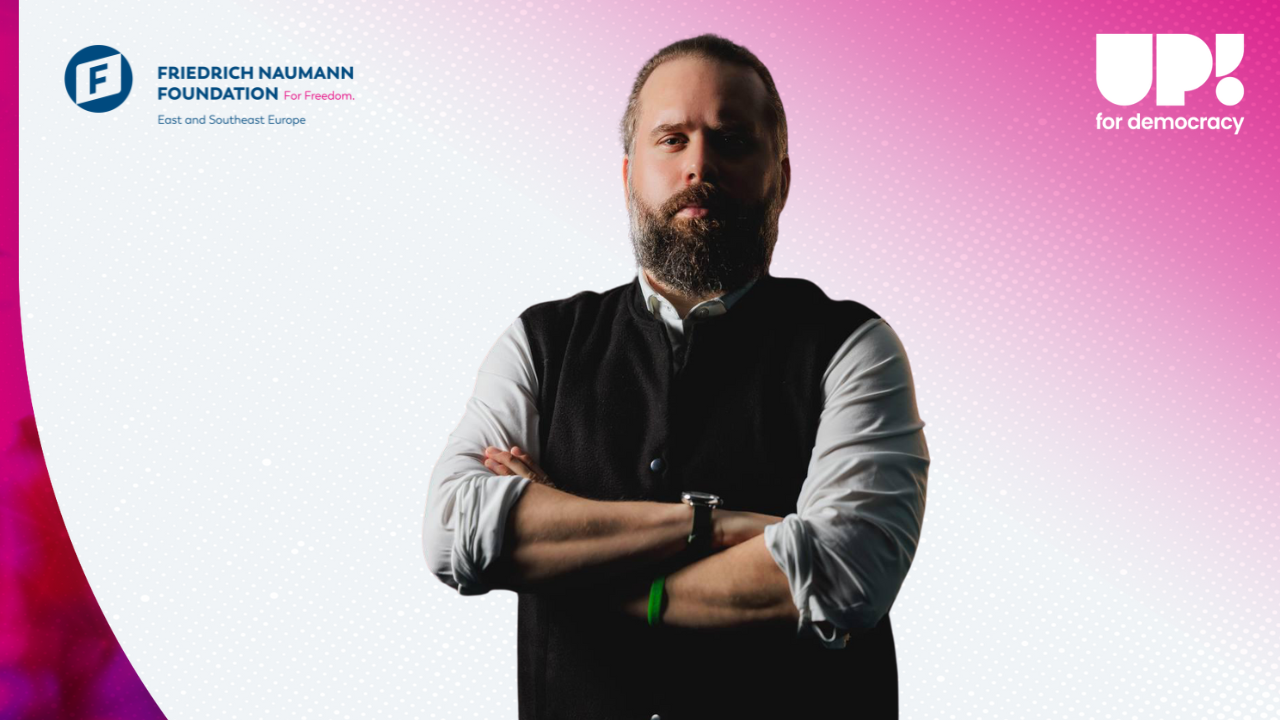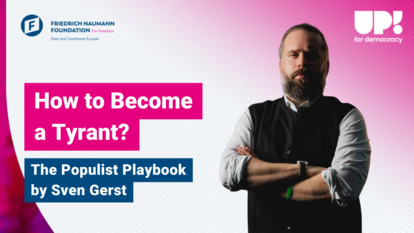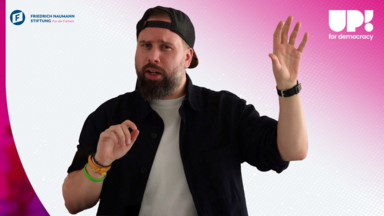Populism
How to Become a Tyrant: The Populist Playbook

How to Become a Tyrant
Nowadays, political landscapes are rapidly shifting, so understanding the mechanisms that can turn democracies into authoritarian regimes is more critical than ever. Today's real threat lies in the covert strategies of modern populists. In the video “How to Become a Tyrant” Sven Gerst unveils their hidden tactics, which he breaks down into seven crucial steps. Discover how populists identify societal grievances, polarize communities, and centralize power, ultimately undermining democratic institutions and consolidating control.
Watch now the second episode “How to Become a Tyrant: The Populist Playbook” from our explainer series “Up! for democracy. The Populist Playbook by Sven Gerst”. Stay tuned for more #populistplaybook videos.
Watch the Video Now
To understand a populist playbook, we have to understand where populism can emerge because populism cannot emerge in isolation. It always comes out of liberal democratic structures or transitional democracy.

Unlike historical dictators, modern populists capitalize on democratic transitions. They identify and exploit societal grievances — ranging from migration issues to economic reforms — transforming these into powerful narratives that resonate with the public. This tactic of identifying and amplifying societal cleavages forms the basis for their strategy, allowing them to gain and solidify support.
Populists are very good at spotting the current cleavage in society where there is a topic that maybe the common political elites are not talking about. And that they can surface and bring forward.

The second step of the “Populist Playbook” is polarizing society. Populists craft a narrative that divides the people into "good" ones, those who support their cause, and "bad" ones, those who oppose it. This division not only unites their supporters but also marginalizes their opponents. The next step follows naturally: the populist emerges as the leader and savior for the “good” people, which puts him into position to run for elections.
By all means, everything is permissible for the populists. As long as they win the elections by the smallest coalition possible, they can take down their opponents, they can lie, they can do whatever they want.

Interested in the remaining steps and the whole process of how modern populists transform democracies into authoritarian regimes? “How to Become a Tyrant: The Populist Playbook” breaks down the tactics populists use to erode liberal democracies, making it clear that the threat is not just historical but very real today. Watch the video now to understand how populists operate and which dangers they pose!
Up! for democracy. The Populist Playbook by Sven Gerst
What are the steps that help populists come to power? Is Donald Trump a dictator? What differentiates authoritarians and dictators from populists? Should liberals become populists or popular? And much more.
Discover more in the Populist Playbook Explainer Series with Sven Gerst, a political philosopher, liberal thought leader and an experienced facilitator. He spends a lot of his time at International Academy of Leadership (IAF) of the Friedrich Naumann Foundation for Freedom. He is the former Secretary General of the International Federation of Liberal Youth. During his work in international politics, Sven has worked with more than 50 political parties, NGOs, and think tanks from all over the world on strategic communication and capacity building. He holds a M.Sc. in Philosophy from the London School of Economics and Political Science as well as a M.Sc. in Management from the University of Mannheim. Previously, he also studied and worked at Harvard University, Duke University, St. Petersburg State University, and National Taiwan University. He is the facilitator of the flagship ‘Liberal Communicators Network’ of mission-driven marketers in the liberal scene in Europe. LCN Non-profit Academy is a project of the European Liberal Forum, in cooperation with FNF East and Southeast Europe and Projekt: Polska Foundation.
If you want to follow the latest from Sven, do subscribe here to his newsletter for insights on global affairs and the state of liberalism.
The Series is part of FNF’s global campaign UP! for democracy. Democracy is not an abstract concept. It is something you could act on every day. All great movements started with people like you. So team up with people who believe in the same idea of standing up for democracy. Because democracy is for you. It’s about you. It always was and will be you. What is your next move? Together we want to shape a world in which free democracies can flourish! #up4democracy
Discover more about UP! for democracy Campaign around the globe.

A Film by: Friedrich Naumann Foundation for Freedom for East and Southeast Europe
Concept by: Sven Gerst, Political Philosopher, International Facilitator, Germany
Inspired from: FNF ESEE Millennial Takeover Program and FNF International Academy of Leadership (IAF)
Project & Communications Manager: Boryana Atanassova, Senior Communications Manager, FNF East and Southeast Europe, Bulgaria
8.29 min
Watch more episodes from the explainer video series.
Understanding Populism vs. Authoritarianism: Why the Distinction Matters

Is Donald Trump a dictator? What differentiates autocrats and dictators from populists? Let’s map them all on a populism spectrum. Discover more in the new Populist Playbook Explainer Series.
The Millennial Takeover Programme
The Populism Playbook Video series is inspired by the Millennial Takeover (MT), which for more than six years has been fostering a network of young leaders to address the most pressing issues. Previous editions focused on how to tackle the rising tide of populism in East Europe and provided a holistic deconstruction of populism, empowering participants with a comprehensive understanding of its underlying values and strategies. Skills labs on political rhetoric, communication strategies, video storytelling equip attendees to effectively counter populist narratives and craft the Anti-Populist Playbook. MT is a flagship annual project, organized by the Regional Office of FNF for East and Southeast Europe and FNF Türkiye.
